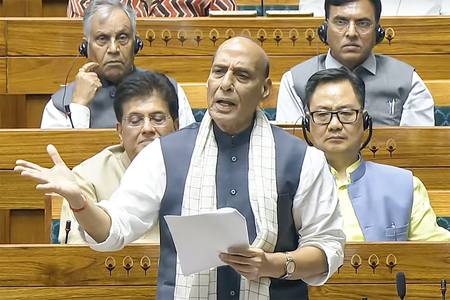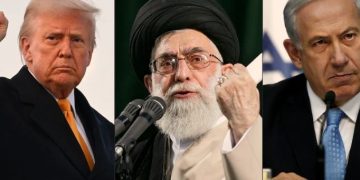New Delhi: Defence Minister Rajnath Singh launched a scathing attack on the Congress-led United Progressive Alliance (UPA) government for its handling of India-Pakistan relations post the 26/11 Mumbai terror attacks and for what he described as a strategic misstep in the 2009 Sharm-el-Sheikh (Egypt) agreement.
Addressing the Lok Sabha Monday, Singh said, “In 2009, the government back then made a mistake in the Sharm-el-Sheikh agreement.”
He was referring to the joint statement issued July 16, 2009, after a meeting between then Prime Minister Manmohan Singh and Pakistan’s Prime Minister Syed Yusuf Raza Gilani during the NAM Summit held in Sharm el-Sheikh.
Defence Minister Rajnath Singh opened the Operation Sindoor discussion in the Lok Sabha.
Singh remarked that the agreement diluted India’s firm stance on cross-border terrorism. “This diluted the terms set that Pakistan will not be allowed to use its land for terrorism,” the Defence Minister stated, contrasting it with the hardline approach adopted by the previous BJP-led NDA government under Prime Minister Atal Bihari Vajpayee.
Singh said Vajpayee had made it unequivocally clear that any dialogue with Pakistan would be contingent upon a commitment to end terror originating from its soil.
Singh didn’t hold back in calling out what he described as the UPA’s failure to capitalise on international momentum after the 26/11 attacks. He accused the Congress government of weakening “India’s strategic positioning” by failing to deliver a strong response to the terror strike in Mumbai that claimed over 170 lives.
Quoting from former President and UPA’s External Affairs Minister Pranab Mukherjee’s memoir, ‘The Coalition Years’, Singh recounted: “Pranab Mukherjee has written in his book ‘The Coalition Years’ that when the Mumbai attacks happened, India had evidence that the terrorists came from Karachi port. No one in the world believed the excuse of Pakistan’s ‘non-state actors’. He has written, and I quote – ‘Amid heated debates within the Cabinet, there was a demand for military intervention which I rejected’.”
The Defence Minister further cited an incident recorded by a senior Indian Foreign Service officer in which a high-level meeting took place immediately after the Mumbai attacks.
According to Singh, Foreign Secretary Shivshankar Menon had proposed a cruise missile strike on the Lashkar-e-Toiba headquarters in Muridke, Pakistan.
Singh narrated: “Hearing this, Mukherjee took off his glasses, cleaned them, and thanked all the officers before concluding the meeting.”
Rajnath Singh argued that such indecision and restraint sent the wrong message to Pakistan. He compared the UPA’s approach to the NDA government’s more aggressive retaliation post the Uri and Pulwama terror attacks, saying: “I believe that if the government back then had taken decisive and tough steps like the 2016 (surgical strike) and 2019 (air strike), Pakistan’s strategic calculus could have been altered. A powerful and decisive action could have proven to be a significant disincentive for Pakistan and its army-sponsored terrorist organisations.”
He also slammed the global diplomatic fallout of the UPA’s response, noting the lack of strong international condemnation after 26/11.
“Just take a look at the documents of the BRICS summit held after that incident; there is no mention of the Mumbai terrorist attacks anywhere,” Singh said, implying a missed opportunity to isolate Pakistan on the world stage.
IANS






































